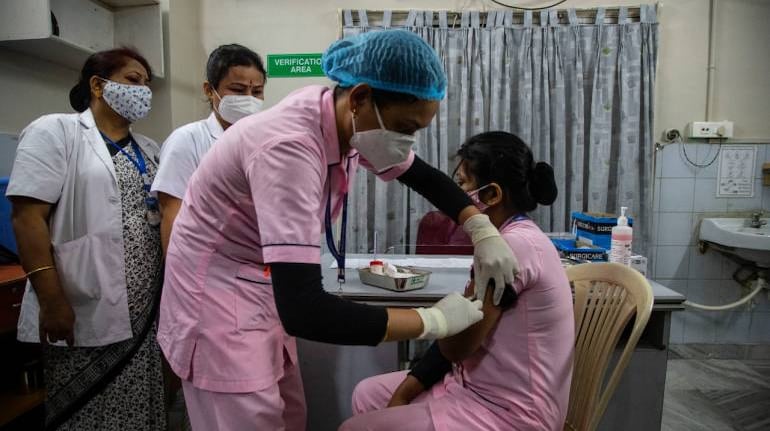



With the government not extending indemnity to Covid-19 vaccine makers, there has been some disquiet among companies about the potential litigation that may arise due to unforeseen complications from Covid-19 vaccines.
It isn’t just the potential litigation of vaccine-linked serious adverse events; executives of vaccine makers are also worried about the high cost of product liability covers they have to buy given the limited data on adverse effects at this stage.
Serum Institute of India (SII) and Bharat Biotech haven’t responded to questions sent by Moneycontrol on the government not extending indemnity.
Adar Poonawalla, CEO of SII, which is manufacturing and distributing the AstraZeneca-Oxford University Covid-19 vaccine in India, had earlier asked the government to indemnify vaccine manufacturers. “We need to have the government indemnify manufacturers, especially vaccine manufacturers, against all lawsuits. In fact, COVAX and other countries have already started talking about that,” Poonawalla said at the Carnegie India’s Global Technology Summit in December. (COVAX is a global collaboration for speedy development, production and equitable distribution of new vaccines worldwide.)
“What’s happening is, if frivolous claims come up and we see in the media something’s blown out of proportion. The government needs to step in,” Poonawalla said.
Earlier, a clinical trial volunteer from Chennai had alleged that he developed a neurological illness after receiving SII’s Covishield vaccine and had sought Rs 5 crore compensation. SII has dismissed the allegations, and has threatened to sue him for Rs 100 crore in damages.
“Given the fact that vaccine makers have taken enormous risk and responded to pandemic situations, the government should have extended indemnity,” said a senior executive at a vaccine company, who did not want to be named.
To be sure, not just Indian vaccine manufacturers, even global ones have been demanding that governments extend protection from the potential lawsuits associated with vaccine-related adverse events if they are to participate in pandemic responses.
Some countries have agreed to indemnify the vaccine makers for claims as part of the purchase pacts. India has not agreed to this so far.
For instance, the US government has granted Pfizer and Moderna immunity from liability if something unintentionally goes wrong with their Covid-19 vaccines. Similarly, the UK government has extended indemnity to Pfizer and AstraZeneca.
The UK has a Vaccine Damage Payments Scheme, which authorises one-time tax-free payments of £120,000 for individuals who have been disabled in the rare event that a vaccine produces highly damaging side effects.
How will companies manage liabilities?Vaccine makers have been taking product liability covers. “So vaccine makers can take product liability covers with specific inclusions for Covid-19 adversities, including death, ahead of the rollout. But this won’t be a one-size-fits-all cover and will have to be customised based on their trial data and efficacy,” said a senior general insurance executive.
“In the case of an adverse event (death/extreme side effects), the customer/kin will have to legally prove that it is caused by the vaccine. Then the insurance company will pay claims,” the executive added.
“From the vaccine manufacturer’s perspective, most would have insurance during the clinical trial phase. But as they step out of that post-approval phase, they will need to calibrate their existing liability insurance to obtain a new cover for claims that might arise in the future,” said Mrinal Ojha, Partner, Phoenix Legal.
“Liability insurance for manufacturers and distributors will be essential, especially when exporting to countries where the exposure to claims might be significantly higher,” Ojha added.
Underwriting challengeInsurance and legal experts say that underwriting of product liability covers is a big challenge due to the limited data on adverse effects. Covid-19 vaccines have been developed in compressed timelines of 12-18 months given the pandemic, and there could be possible risks of side effects that may not have been factored in at the moment. Vaccines usually take anywhere between 5 and 10 years to develop.
“There isn’t enough data at the moment to price these risks properly and premiums might expectedly be higher at this stage,” Ojha said.
“Add to that the unusual complications concerning unique storage requirements and managing scheduling of vaccines, which are added to the chain, starting from the sourcing of raw material to delivery, including the adequacy of the content in the labelling. The public-private partnership with these vaccines is also somewhat complicated on the sharing of risks of loss,” Ojha said.
Experts such as Zulfiquar Memon, Managing Partner, MZM Legal, say that the vaccine makers must be protected in some form by the government as they are working with the government to ensure smooth supply and effective dosage to reign in a raging pandemic.
“The government must provide security and indemnity to these vaccine makers in such cases if we want them to continue production and supply to ensure every person is diligently vaccinated,” Memon said.
Will individuals get medical insurance for a vaccine’s side-effects?There is some confusion over whether existing medical insurance will cover potential vaccine side effects. Moneycontrol had in December reported that existing health insurance policies are unlikely to cover the cost of vaccination and adverse reactions, if any. Only a policy designed purely for the Covid-19 vaccination process — there is none at the moment — will cover the costs.
“Since customers cannot directly purchase any medical insurance for vaccine side-effects, they are at a high risk in the absence of liability covers,” said the underwriting head at a state-run insurer.
Discover the latest Business News, Sensex, and Nifty updates. Obtain Personal Finance insights, tax queries, and expert opinions on Moneycontrol or download the Moneycontrol App to stay updated!
Find the best of Al News in one place, specially curated for you every weekend.
Stay on top of the latest tech trends and biggest startup news.